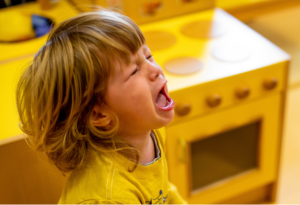January 29, 2023
This week’s article is from our dear friend and colleague, Mary O’Connell. Mary has a non-profit farm education program and LifeWays Representative site at Paradise Farm in West Bend, where she and her colleagues provide outdoor, farm-based education to children and adults.

“Kids who haven’t responded to natural consequences don’t need more consequences.” – Dr. Ross Greene
In my role as a coach for childcare center directors in Wisconsin, I talk with a wide variety of people who are just plain bone-weary from working in the early childhood field the past few years. Coming out of the pandemic, programs are severely under-staffed and teetering on razor-thin margins between profit and loss. On top of all the administrative challenges, early childhood professionals are faced with a larger-than-ever number of children needing extra help. Veteran and new teachers and caregivers alike are feeling unprepared to handle the behavior challenges they’re experiencing daily. I frequently hear directors say, “We want to work with this child, but we have to consider the needs of all the other children in the classroom.” It seems that, for many children today, the demands of life in the early childhood program exceed their capacity to adapt. They cry or sulk, they kick or hit, they scream and tantrum. And their teachers lay on the natural (or sometimes quite unnatural) consequences to try to help them fall in line with the group. These consequences often don’t work. So, what do we do then?
I’ve recently been introduced to a simple concept introduced by Dr. Ross Greene, a child psychologist who wrote The Explosive Child, among others. The concept is this:
Kids do well if they can.

Many of us operate under the assumption that children do well if they want to. And we spend a good deal of time trying to get them to want to. We assume – for example — that simply because a child was able to get himself ready to go outside last week, and this week he is lying on the floor crying and saying he needs help, he must not want to do it. By re-framing our thinking to assume that he would do it if he could do it, we find our compassion and our calm. And it helps us open ourselves up to observing what is really going on with the child. To observe truly and objectively, we must be willing to let go of our assumptions about the child, his home life, or anything else. We must be willing to take an honest look at what we’re asking children to be able to do and really consider whether it’s age appropriate. And we must be willing to give each child the benefit of the doubt.
As Dr. Ross Greene says, “Children are resilient. They start to come around if we start doing the right thing.”
Sometimes it can be so hard to know what the “right thing” to do or say is, especially when we are tired or frustrated or feeling like we are in over our head. That’s when we need to remember to offer ourselves the same loving kindness we give to the children. We adults also do well when we can. Sometimes we just need to take a second to breathe and recognize that we’ve been through a lot these last few years. Let’s give ourselves and the children the compassion we deserve.
**Click here to learn more about Dr. Ross Greene and his most recent book, Raising Human Beings.

I resonate so strongly with the description of the program challenges above, and I was ready and already feeling relief for the answer to “ So, what do we do then?” when our consequences do not work.
I am not sure, however, that I am understanding Dr. Greene’s message. Is the answer to do nothing? Take them out of the program and keep them at home? I so honestly need practical answers to this question because it is a huge challenge in our program right now.
Many thanks for clarification,
Ms. Shannon
Hello Shannon,
Thank you for the inquiry! I’m sorry to say there isn’t really an easy answer, nor a list of practical tips and tricks for this one. It’s just so very individual to every child. An important point in Mary’s article that reflects the heart of Greene’s work is this one-
“We must be willing to take an honest look at what we’re asking children to be able to do and really consider whether it’s age appropriate.”
And, I would add, that we must ask if it’s appropriate for that child at this moment. We all have days and times when we perform differently based on the larger context of our life. It’s not about saying they can’t do it and sending them home, and it’s not about giving up and doing it for them. It’s about observing and finding the balance that empowers them to keep growing in self-sufficiency.
This can all be challenging but it is absolutely possible. We would love to help support you in this journey, and Mary and I have planned, in response, to write three more articles about this topic.
If you would like help with a deeper examination of your program and how it can support you in meeting the children appropriately and with success, feel free to contact us via social media.
Thanks again, Shannon. Many blessings on your work!
Acacia Moore
Beautiful simplicity, so thoughtful and real and immediately applicable. Thank you for sharing, Mary.
I really can appreciate the realities that are often seen and felt in our present day KG’s. As a mixed age KG teacher, I have witnessed a great shift from previous years in what the children “can do” and ” can’t” and their resilance..or lack there of.
I agree that the openess in my own perception and expectations can often aid in the shifting for a child, however I would also have loved to hear the authors perperctive for when empathy and openess are not enough and the “can’t do” becomes so very difficult for the class as a whole.
Kelly,
Thank you for your comment. This may not exactly hit the spot for your situation, but I will offer a suggestion based on what I can “read” from your comment.
Sometimes in seeking to meet the children as a whole class, we must look at prioritizing what we are trying to do in one day.
For example, my class started the year with several children who had been at home throughout the pandemic and so they were really needing support in how they play and how they do most things for themselves. Part of my response was keeping our day basic- solid rhythm, play and space to do everything at child’s pace. We didn’t do as many “circle activities” and we didn’t do more than coloring or play dough for many weeks so that extra time and energy could be put into these aspects. Eventually, we picked up everything else up and the days are now running smoothly.
I hope this at least helps a bit, and that you noticed in a comment above that Mary and I have planned to write three more articles about this topic.
If you would like help with a deeper examination of your program and how it can support you in meeting the children appropriately and with success, feel free to contact us via social media.
Thanks again, Kelly. Many blessings on your work!
Acacia Moore